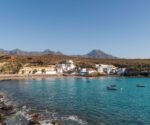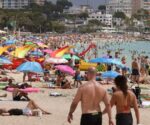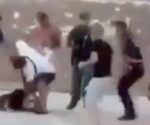‘I escaped a North Korean prison and now I can celebrate Christmas’ | World | News

Timothy Cho escaped North Korea on his second attempt and now lives in the UK (Image: Daily Express/Andy Stenning)
The prison was deep underground, and Timothy Cho was cramped into a tiny cell with around 50 other inmates.
He tried to block out the screams of people being tortured a few feet away. But there was no escape, not yet, at least.
Sleeping offered a short respite, drifting off with cell-mates, packed so tightly together in the darkness they couldn’t lie down and had to lean on each other for comfort.
One night, the man behind him started leaning into him quite hard, his weight gradually pushing down more and more. The man pushed into him even more, nudging him to make some room. It was then that Timothy realised: the man was dying.
He felt a damp patch on his back, growing larger and larger. He realised what was happening. The man’s blood was streaming out all over him.
Timothy Cho was just a teenager. The son of traitorous parents, a member of North Korea’s “hostile class”, the lowest of the low and smeared for life.
He was also one of the thousands who tried to escape North Korea’s brutal regime but failed. At least,that was the case the first time.
Sitting at his new home in Greater Manchester, Timothy said: “This winter feels colder, reminding me of North Korea where, as CS Lewis wrote in The Lion, the Witch and the Wardrobe, it is always winter, but never Christmas.”
READ MORE Vladimir Putin rages at BBC reporter and mocks Rachel Reeves’ economy
It is the father-of-two’s sixteenth Christmas in the UK, a time to celebrate with friends, family and congregation members at his church. But the holiday also triggers memories of his native North Korea.
He said: “Every December, especially as New Year approaches, you miss your hometown, for a while. I will still never forget the life I spent there, till aged 17.”
At this time of year, people in North Korea are preparing to mark the birthday of Kim Jong-Suk, grandmother of the country’s current supreme leader, Kim Jong-Un, and first wife of the Republic’s founder, Kim Il Sung.
Men, women, and children all over the country will take part in concerts to celebrate her birthday on December 24 and lay flowers at the feet of Kim’s family statues.
Timothy said: “All of December is about showing loyalty, devotion, and love to the Kim family, starting with the first Kim’s wife. The most special holidays in North Korea are about the Kim family.”
He recalled how as a child he would wake at 5.30 in the morning and look forward to visiting local statues of the Kims to help clean them.
An abiding memory from Timothy’s childhood is of going to see a friend who had been missing from school. He remembers knocking at the door, but no one answered.
Pushing open the door, he saw his classmate and the rest of his starving family lying on the floor, their eyes bulging and limbs swollen after eating grass.
Fearing for their lives, Timothy and fellow pupils collected donations of food to give to the family, whose members rallied for a short time but eventually fell back into starvation.
Timothy, 36, said: “There are some tragic memories. Especially after my parents escaped to China. I came back from school, and my parents had left. As soon as I opened the door, I could feel a frozen wind hitting my face, and I realised my parents were gone.”
He rushed to the train station, thinking he could catch them, but they were nowhere to be seen. Broken-hearted, Timothy dropped down beside the tracks and cried.
A few days later, he went to his uncle and aunt’s house, but they had three children of their own and were struggling to scrape enough food together for five, let alone six.
Desperately hungry, Timothy ate what scraps he could find on the floor or whatever he could beg for at a local market. He even resorted to stealing. Homeless and alone, he slept in empty train containers and under bridges.
“That was part of my childhood. Until my parents escaped, both my parents were high school teachers, loved by their students. I was proud of being the son of teachers. They are very important in North Korea as they have to keep brainwashing the generations.”
He explained how his father was unhappy teaching a distorted history and was unable to tell the truth. When he couldn’t hold in his anger any longer, he drew the attention of the authorities and had to choose between fleeing or detention in a gulag.
“The consequences were my family was broken into pieces. I had to survive. I couldn’t attend school. I was the son of a traitor,” Timothy said.
Frozen out by the state as a member of the “enemy class”, he was bullied and shunned as the child of a betrayer. “It was impossible to live in North Korea,” Timothy said.
In time, Timothy travelled to his grandmother’s in the mountains in the north, where winters are bitterly cold.
At the age of 17, Timothy was turned down for North Korea’s compulsory military service because his father was a traitor. He said: “That was shocking when I heard it. I had been brainwashed to regard the Kims as my gods. That brainwashing started from age one. But at this point, they were discriminating against me.”

North Koreans are brainwashed into hero worship of the Kim family (Image: Getty)
He begged the authorities to let him pay back his father’s “crime”, but they refused, telling him to get a job at one of North Korea’s coalmines, where Timothy said many children from the country’s “hostile class” families work and suffer terrible injuries.
Timothy said: “I felt abandoned twice. I couldn’t go to school, and now the state was discriminating against me. I decided to escape.”
On his first bid for freedom, the teenager crossed the Tumen River, part of the border between North Korea and China, with a family and guide.
Crossing at night to avoid being spotted by armed border guards, they made it across, lying low nearby for a couple of days before splitting up. Timothy walked for hours to get to a market.
It was shocking for him to see China’s colourful electric lights, smell the delicious food at the market, and watch young people wearing jeans with holes and sporting different hairstyles. In North Korea, such luxuries were not allowed. The nights are pitch black, and everyone in school is forced to wear the same haircut, with teachers measuring its length.
He met a missionary, who took him to his house, where Timothy’s first observation was the crucifix on the wall and the Bible. The house was full of children, too, making the young escapee fear the man was a human trafficker who wanted to sell his organs.
Timothy explained his reaction was the result of North Korean indoctrination to smear Christians, who are closely associated with North Korea’s arch-enemy, the United States.
Running away, Timothy managed to make it to the Mongolian border but was arrested along with 17 other North Korean refugees. His first bid for freedom had failed.
Locked up in a military detention camp, Timothy was sent back to North Korea, where he was interrogated about whether he had been to a church, prayed or met any Westerners. Admitting to meeting someone from the West would have resulted in a charge of espionage.
It was then that Timothy was thrown into the underground prison, told he no longer had a name, just a number, and was forced into a tiny cell where no one could lie down. It was here his cellmate died.
He said: “When we reported it, they asked us to remove him from the prison cell. That was a nightmare picture. At night-time, you could hear screaming, beating and torture, begging policemen to leave.”
After a few days, Timothy couldn’t stand up or sit down. He was constantly asked who organised his journey to the Mongolian border.
“Because of that, they kept beating you. Denying all of this, I was badly treated. I couldn’t walk. Strangely, they decided to send me to my grandmother’s, where the police would keep an eye on me.”
In time, Timothy recovered and attempted to escape the country again. Crossing the Tumen River again, which was then in flood, and arriving in China, he was sheltered by a woman, who hid him in a storeroom and gave him some food.
He said: “The second escape was literally the escape I shouldn’t have survived, but I survived.”
Timothy travelled to Beijing, where he met some other North Koreans, before moving on to Shanghai, where the group sought help from an international school.
Chinese police arrived and forcibly dragged them into police vans in front of terrified schoolchildren.
They found themselves in prison, where Timothy was told he would be sent back to North Korea. He knew that meant a death sentence, a public execution in front of crowds, just as he had seen as a boy. A firing squad armed with AK47s and three bullets.

Defection numbers have fallen since Kim Jong-Un came to power in 2011, experts say (Image: Getty)
His hopes for freedom dashed, and feeling helpless, he overdosed on sleeping pills, crashing to the floor, hoping to die.
But he woke again, finding himself in a jail full of international inmates in Shanghai, where he met a South Korean gangster who took him under his wing and shared a copy of the Bible with him.
Urged to pray, Timothy’s first-ever prayer was to ask God not to be killed and to get out of prison. He vowed to devote his life to God in exchange for his freedom. Not long after, two foreign diplomats informed him that he would be deported to the Philippines.
A 13-year-old girl, shocked at what happened at the school where Timothy tried to get help, wrote to a journalist, urging them to help.
The story broke and travelled worldwide, piling pressure on China not to deport him. Timothy said: “God answered my prayers.”
Starvation, poverty and political pressures continue to drive North Koreans to risk escape, although defections have decreased significantly since Kim Jong-Un gained power in 2011.
South Korea remains the most popular destination for North Korean refugees, with more than 33,000 refugees settling there as of December 2020, according to Crossing Borders.
Between 2007 and 2016, a total of 820 North Koreans settled in Europe, with the majority setting up homes in the UK and Germany after making their perilous escapes.
Timothy said: “I have experienced all kinds of tragedies, atrocities and crimes against humanity. A man dying in a prison cell. Men executed. Starvation on the streets. Men and women being tortured. Myself, going through darkness. But at the same time, I also saw the kindness of humanity.
“Because of that young lady who wrote those few words, I am going around the world telling the world about the kindness of humanity. The prisoners in Shanghai celebrated my freedom as if it was their own.
“I’m grateful sometimes for what I’ve gone through. I understand the pain children growing up without families might have. The refugee situation. The kindness of humanity. This is why I am still standing.”
Since gaining his freedom, Timothy has travelled the world, meeting political leaders, schoolchildren, university students and church groups to share his experience of life under a totalitarian regime.
He said: “These are challenging times. Young generations need to know what life with freedom means. Democracy is not perfect, but there are still far more opportunities.”
A British citizen after first arriving in the UK as a refugee, Timothy now works for an All-Party Parliamentary Group, which focuses on human rights, exiles and the security challenges North Korea poses.
The graduate of Liverpool and Salford universities also acts as a spokesperson on North Korea for Open Doors UK and Ireland, which monitors and campaigns for religious freedom worldwide.
Open Doors estimates there are some 400,000 Christians in North Korea, many of whom are being held in labour camps and prisons.
Being discovered as a Christian in North Korea is “effectively a death sentence”, according to the organisation, with Christian women “acutely vulnerable” to sexual violence.
Acts taken for granted in the West, such as meeting for worship, have to be done in secret, with North Korea’s authoritarian regime viewing Christians as a particular threat.
But here in the UK, as Christmas Day approaches, Timothy is free to celebrate the birth of Christ. There will also be time for feasting and presents with his young family.
He said: “The greatest gifts for me are freedom of faith, freedom of expression, being able to choose and all the opportunities here.”









